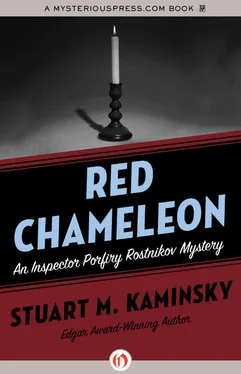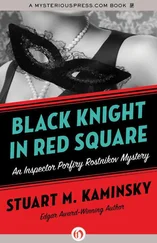Stuart Kaminsky - Red Chameleon
Здесь есть возможность читать онлайн «Stuart Kaminsky - Red Chameleon» весь текст электронной книги совершенно бесплатно (целиком полную версию без сокращений). В некоторых случаях можно слушать аудио, скачать через торрент в формате fb2 и присутствует краткое содержание. Год выпуска: 2012, ISBN: 2012, Издательство: MysteriousPress.com/Open Road, Жанр: Полицейский детектив, на английском языке. Описание произведения, (предисловие) а так же отзывы посетителей доступны на портале библиотеки ЛибКат.
- Название:Red Chameleon
- Автор:
- Издательство:MysteriousPress.com/Open Road
- Жанр:
- Год:2012
- ISBN:978-1-4532-6632-8
- Рейтинг книги:4 / 5. Голосов: 1
-
Избранное:Добавить в избранное
- Отзывы:
-
Ваша оценка:
- 80
- 1
- 2
- 3
- 4
- 5
Red Chameleon: краткое содержание, описание и аннотация
Предлагаем к чтению аннотацию, описание, краткое содержание или предисловие (зависит от того, что написал сам автор книги «Red Chameleon»). Если вы не нашли необходимую информацию о книге — напишите в комментариях, мы постараемся отыскать её.
Red Chameleon — читать онлайн бесплатно полную книгу (весь текст) целиком
Ниже представлен текст книги, разбитый по страницам. Система сохранения места последней прочитанной страницы, позволяет с удобством читать онлайн бесплатно книгу «Red Chameleon», без необходимости каждый раз заново искать на чём Вы остановились. Поставьте закладку, и сможете в любой момент перейти на страницу, на которой закончили чтение.
Интервал:
Закладка:
Her hand went back to the rifle.
“And you are sure your illness was a result of-”
“I’m sure,” she shouted. “I feel it.”
“A doctor confirmed-”
“I don’t need a doctor to confirm what my body knows,” she said. “My mind knows that the state killed me and left my body to walk about. I know you are one of the tentacles of the state, that I must cut down as many tentacles as I can. My life may be small, but it will have this meaning, demand this attention. I’m dying.”
“And so are we all,” Karpo said, stepping a bit closer to the woman, whose red eyes were fixed on his own.
“But some of us sooner than others,” she said with a smile.
“Yes,” he agreed.
She raised the rifle, and Karpo saw the dark hole of the barrel searching his face. His chance was to keep her sights high, to move low after she shot. If the rifle came down, it would be aimed at his body, and even a miss might take off his head.
“Why aren’t you afraid, policeman? There is a gun in your face. People with guns in their face are afraid. People are afraid to die, policeman.”
“You are afraid to die, Vera Shepovik.” He took a step forward and continued. “You are quite right. I am a part of the state. I can be killed, and you will either be caught or you will die from whatever it is that tears at you.”
“Be afraid,” she shouted. “It doesn’t have meaning if you aren’t afraid. It doesn’t count if I can’t see-”
“The policeman you shot two days ago was thirty years old,” he said, moving to within four feet of her; the rifle was almost touching his mouth. “He was quite brave, a hero.”
“And that is why you hate me,” she said in triumph. “Now I understand. You want revenge.”
“No. I want you to understand that your act has no meaning. You kill us, and there are others. You accomplish nothing. Come from this roof and we will get you to a hospital where you can be looked at, where you can find out what is really within you.”
She laughed and looked for an instant at the sky, but the rifle did not move.
“And I will be kept alive long enough to be executed.”
There was no denying it.
“I can’t allow you to kill again,” he said softly.
“And I can’t stop,” she said almost softly. “There is a painting in the Pushkin Museum …”
The moment was strange, intimate, and Karpo, blaming his fever, his pain, the quivering cold, wet skin, felt that he could love this woman. The thought almost got him killed. The metal click of the rifle entered him, was absorbed without thought. When the bullet cracked, his head was already moving down to the right. There was a roar, an explosion, and he felt his inner ear vibrate and go deaf. His left arm went up, hitting the barrel of the rifle as he sprawled backward, awkwardly unable to use either hand to stop him from crashing to the rough, wet roof. He rolled quickly over, sensing the barrel of the rifle striking the space where his head had been.
Karpo scrambled up, expecting to be hit or pushed over the edge twenty floors to the street. He wondered what the sensation would be, whether he would have time to think, observe, before he was absorbed into the pavement.
He managed to get his pistol out awkwardly in his left hand as Vera raised the rifle to strike again.
“Enough,” he said gently. “Enough.”
Something in his voice stopped her. She had expected anger, hatred, but this walking death of a man gave her only a sense of understanding. It was not what it should be.
“Damn you, policeman,” she said.
She threw the rifle over his head, and it sailed down toward Kutuzov Avenue.
“All over,” Karpo said, feeling his head go light, warning him that he might soon simply pass out.
“No,” she said, stepping to her right to the edge of the hotel. She looked over the side in the direction she had thrown her rifle. Her hair blew back. Tears were in her eyes.
“Perhaps, if I aim carefully, I can hit a policeman walking by. On the television they jump from airplanes and guide themselves.” She looked down, and Karpo aimed his pistol at a pink, faded rose on her dress.
“No,” he commanded.
She was standing on the narrow wall, not looking at him, looking downward, biting her lower lip.
“Vera,” he said gently, and she looked at him. He had the impression that she was listening, was considering stepping back.
She did indeed say, “Maybe,” as her foot slipped on the wet mounting and she went over the edge, her head striking the wall with a horrible crack before she tumbled out of Karpo’s sight.
Karpo fell to his knees and managed to roll over to the trombone case, to pull it to him. He put his pistol back in its holster and laid his head on the case, his eyes to the gray sky. Emil Karpo passed out.
Lydia Tkach’s hearing was poor. She resisted the urgings of her son and daughter-in-law to get an electric thing to stick in her ears. At the Ministry of Information Building where she worked filing papers, she was not a popular woman. The primary reason for her lack of popularity was that she called attention to herself by the volume of her conversation. She would, in addition, when able to trap a listener, be sure to get in the information that her son was a high-ranking government official. And so people avoided Lydia Tkach, which made her lonely and crotchety, which in turn made her turn her son and daughter-in-law into a captive audience at home.
“Something’s wrong,” she shouted with satisfaction when Sasha tried to enter the small apartment without calling attention to himself.
“Nothing’s wrong,” he answered, looking around for Maya. “Mother, I’m just tired.”
“You look tired,” Lydia shouted. “You look tired and dirty.”
“Mother …” he said in a loud whisper.
“What have you been doing?”
“My job,” he said, taking off his jacket and looking at the closed door of the bedroom, slightly more than closet-sized, that his mother slept in and in which Maya sometimes sought refuge after her long day of work. “Is Maya home?”
“Resting,” Lydia shouted, holding up a finger to her lips to indicate that they should both be quiet, which was exactly what they were not being. “She’s going to have a baby.”
“I am well aware of that, mother,” he said, brushing his hair back from his forehead. He wanted to look in a mirror to see if guilt were on his face. Sasha was very good at lying with his face, with his eyes. He had learned to develop it in his work. It was a skill that went well with his youthful, open face, but Marina, the car thief, had seen through it and through him, and now he moved to the table near the window with no place to hide.
“We’re having dinner,” his mother yelled, a knowing smile on her face. She was a frail woman with an iron will under which Sasha had frequently been broken. Lydia had never been physical, never hit him. She simply kept up her barrage of words and fierce determination until she achieved victory or drove her opponent from the room.
“We usually do, mother,” he said, his stomach growling, wondering how he could face his pregnant wife.
“For dinner we’re having kulebiaka stuffed with salmon and cabbage soup,” she said, walking over to him. She was wearing her at-home sack, a simple baglike creation with three holes, one for the head and two for her arms. Lydia claimed it was the fashion in France to wear such things. Neither Sasha nor Maya had argued with her.
“And you want to know what else?”
“What else?” he asked dutifully, wanting to put his head in his hands, wanting to take a shower, wanting to emigrate to Albania.
“Cherry vodka, a whole bottle,” Lydia said, putting her hands on her hips and waiting. Obviously, there was a question to be asked by her son, but he was too distracted to know what it might be.
Читать дальшеИнтервал:
Закладка:
Похожие книги на «Red Chameleon»
Представляем Вашему вниманию похожие книги на «Red Chameleon» списком для выбора. Мы отобрали схожую по названию и смыслу литературу в надежде предоставить читателям больше вариантов отыскать новые, интересные, ещё непрочитанные произведения.
Обсуждение, отзывы о книге «Red Chameleon» и просто собственные мнения читателей. Оставьте ваши комментарии, напишите, что Вы думаете о произведении, его смысле или главных героях. Укажите что конкретно понравилось, а что нет, и почему Вы так считаете.












